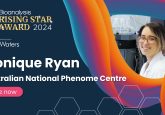Bioanalysis Rising Star Award finalist: Abhishek Jain
Nominated by: Caroline Johnson, Associate Professor at Yale School of Public Health (CT, USA)
Supporting comments:
“Dr Abhishek Jain is an exceptional bioanalyst whose contributions have transformed cancer metabolomics and microbiome research. His innovative approaches have propelled scientific discovery and empowered the global research community with transformative tools and open data resources. Dr Jain spearheaded the development of a large-scale metabolomics dataset from over 5,000 samples, including colorectal cancer tumors and gut microbial cultures, uncovering critical molecular differences between right- and left-sided liver metastases. His multi-omics approach offered invaluable insights for personalized medicine, bridging fundamental science with clinical relevance. His work has been recognized at major conferences within the clinical and metabolomics communities.
Dr Jain has also pioneered advancements in dried blood spot metabolomics, developing robust normalization strategies to overcome hematocrit variability, setting new benchmarks for precision in bioanalysis. Dealing with varied and novel sample types, he consistently demonstrated exceptional problem-solving skills—critically assessing every step from sample preparation to LC–MS and statistical analysis. His ability to troubleshoot and find innovative solutions has been exemplary. Additionally, Dr Jain’s creation of the first interactive colorectal cancer metabolome map revolutionized the exploration of metabolic heterogeneity, fostering collaboration and innovation. This resource underscores his commitment to open science and public engagement. His unwavering dedication to scientific excellence positions him as a rising leader in bioanalysis.”
Describe the main highlights of your bioanalytical work
My bioanalytical research integrates untargeted metabolomics, gut microbiology and translational cancer research to identify novel metabolic pathways in human health and disease. I have developed LC–MS and GC–MS metabolomics platforms that have led to the discovery of previously unknown sulfated metabolites, now incorporated into the Human Metabolome Database, expanding our understanding of gut microbiome-host metabolism. Additionally, my dried blood spot metabolomics method, addressing hematocrit bias, has been widely adopted in epidemiology, childhood cancer research and exposomics, improving sample collection and analysis.
In colorectal cancer (CRC), I constructed a CRC metabolome atlas from 800 patient samples, revealing metabolic heterogeneity across tumor subsites, challenging conventional CRC classifications, and improving precision medicine approaches. My research on liver metastases in right- vs. left-sided CRC identified EGFR inhibitor resistance mechanisms, paving the way for targeted therapies. My gut microbial metabolomics resource with 310 in-vitro gut bacterial cultures and 112 monocolonized mice models is among the most advanced worldwide.
To support my independent research on gut microbiome metabolism of diet and pollutants in cancer, I was awarded the prestigious KL2 Research Scholar grant (NIH-NCATS). My contributions have been recognized with the “Outstanding Early Career Faculty Award” from the Association of Clinical and Translational Science, reflecting my impact on the bioanalytical community.
VIEW THE OTHER FINALIST PROFILES






